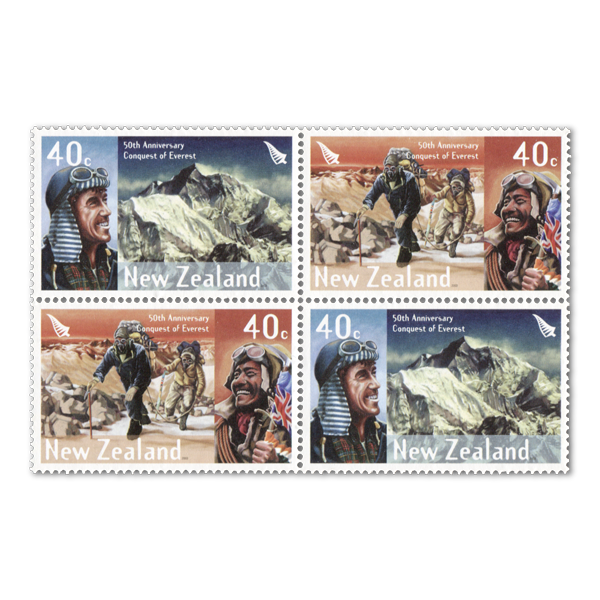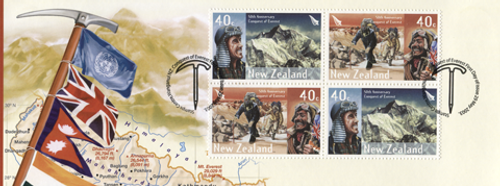"Well George, we knocked the bastard off!" With those now-famous words, New Zealander Sir Edmund Hillary announced the conquest of Mount Everest on 29 May 1953.
Issue information
Together with Nepalese Sherpa Tenzing Norgay, Sir Edmund Hillary had achieved what no man had ever done before - reached the summit of the world's tallest mountain: the roof of the world.
Fifty years later, we celebrated this momentous event and these two extraordinary men with a special se-tenant set. We saluted their determination to confront and conquer one of the last of the Earth's great challenges, in one of the last times in history when such a feat could be recognised as distinctly human rather than technological.
Hillary and Norgay were part of a British expedition led by mountaineer John Hunt. After an earlier pair had to retire 90 metres short of the summit, the two men - recognised as the strongest and fittest in the team - were chosen to try the ascent. They left the last camp at South Col in the freezing dawn of 29 May, and five hours later Hillary stepped onto the summit. He recorded the event with a dramatic photograph of Norgay, the alternative being impossible because, said Hillary, "as far as I knew he had never taken a photograph before, and the summit of Everest was hardly the place to show him how."
The conquest paved the way for a new era in Everest mountaineering - and for New Zealand it was a defining moment in our history as one of our nation's sons became our most famous hero.
A Goddess Among Mountains
Called Chomolungma (goddess mother of the world), this towering mountain was known as Peak XV until 1856. It was then renamed Mount Everest after Sir George Everest, the British Surveyor-General of India who was the first person to record its height (8,850 metres) and location. Before the Hunt expedition there had been seven previous attempts to reach the summit, the first in 1922 - none succeeded.
Today, the bustling autumn and springtime activity on Mount Everest makes it easy to forget that over 50 years ago the summit seemed as unattainable as the surface of the moon. It is the dream destination of many climbers, with a steady influx attempting the still demanding and dangerous challenge. The numbers have continued to increase over the years, with a new record being set on 16 May 2002 when 55 climbers scaled the peak - the largest number to conquer the world's tallest mountain on a single day.
Single Stamps
The Conquest of Everest stamp issue offered two 40c stamps, featuring dramatic scenic views. Both stamps captured expressions of sheer delight and relief which, must have flickered across the faces of Sir Edmund and Tenzing.
Sheetlet
The conquest of Everest was also captured on a sheetlet and first day cover - the magnitude of the climb, the arduous ascent, and the two men who made it happen, emerging triumphant to worldwide adulation.
Product Listing for Conquest of Everest
| Image | Title | Description | Price |
|---|---|---|---|
 |
Sheetlet | Mint, used or cancelled sheetlet of 10 x 40c stamps. | $4.00 |
 |
Se-tenant Set | Mint, used or cancelled se-tenant set of 4 x 40c stamps. | $1.60 |
 |
First Day Cover | First day cover with se-tenant set affixed. Cancelled on the first day of issue. | $2.10 |
Technical information
| Date of issue: | 29 May 2003 |
|---|---|
| Number of stamps: | Two |
| Denominations and designs: | 40c Sir Edmund Hillary - Mount Everest, 40c Tenzing Norgay - ascending Mount Everest |
| Stamps and first day cover designed by: | Stephen Fuller, Watermark, Wellington |
| Printer and process: | Southern Colour Print, Dunedin by offset lithography |
| Number of colours: | Four process colours |
| Stamp size and format: | 47.14mm x 30mm (horizontal) |
| Paper type: | De la Rue 103gsm red phosphor stamp paper |
| Perforation gauge: | 14 |
| Number of stamps per sheet: | 50; Sheetlets of 10 |
| Special blocks: | Plate/imprint blocks could be obtained by purchasing at least eight stamps from a sheet. Barcode, value blocks and logo blocks could be obtained by purchasing at least four stamps from a sheet. Barcode blocks were available in both A and B format. |
| Period of sale: | These stamps remained on sale until 28 May 2004. |

